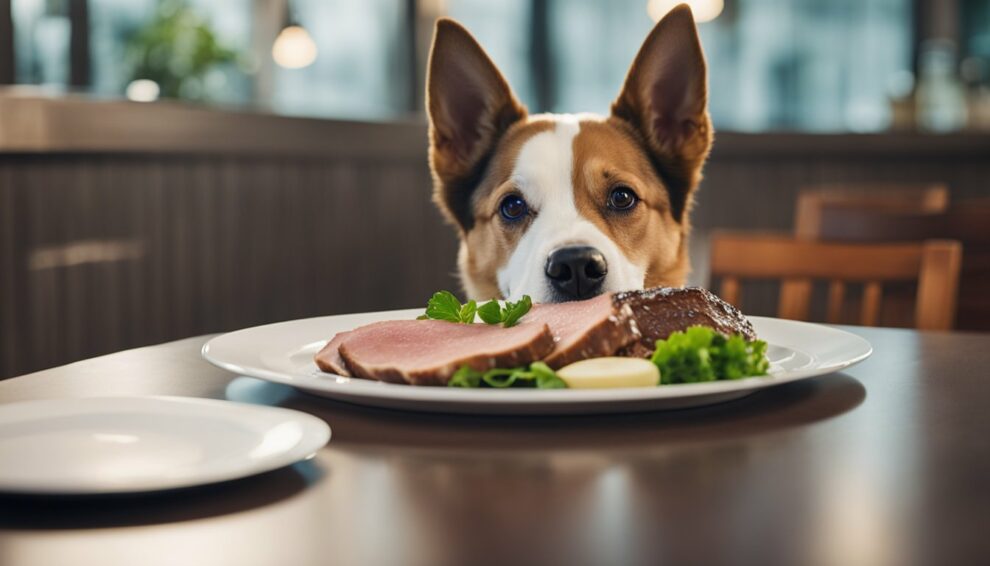When it comes to feeding our furry friends, we naturally want to share our meals with them, especially when they gaze at us longingly.
However, not all human food is suitable for dogs, and pork, in particular, is a meat we should be cautious about.
Various reasons, such as potential health risks and the presence of harmful parasites, make pork a less than ideal choice for canine companions.
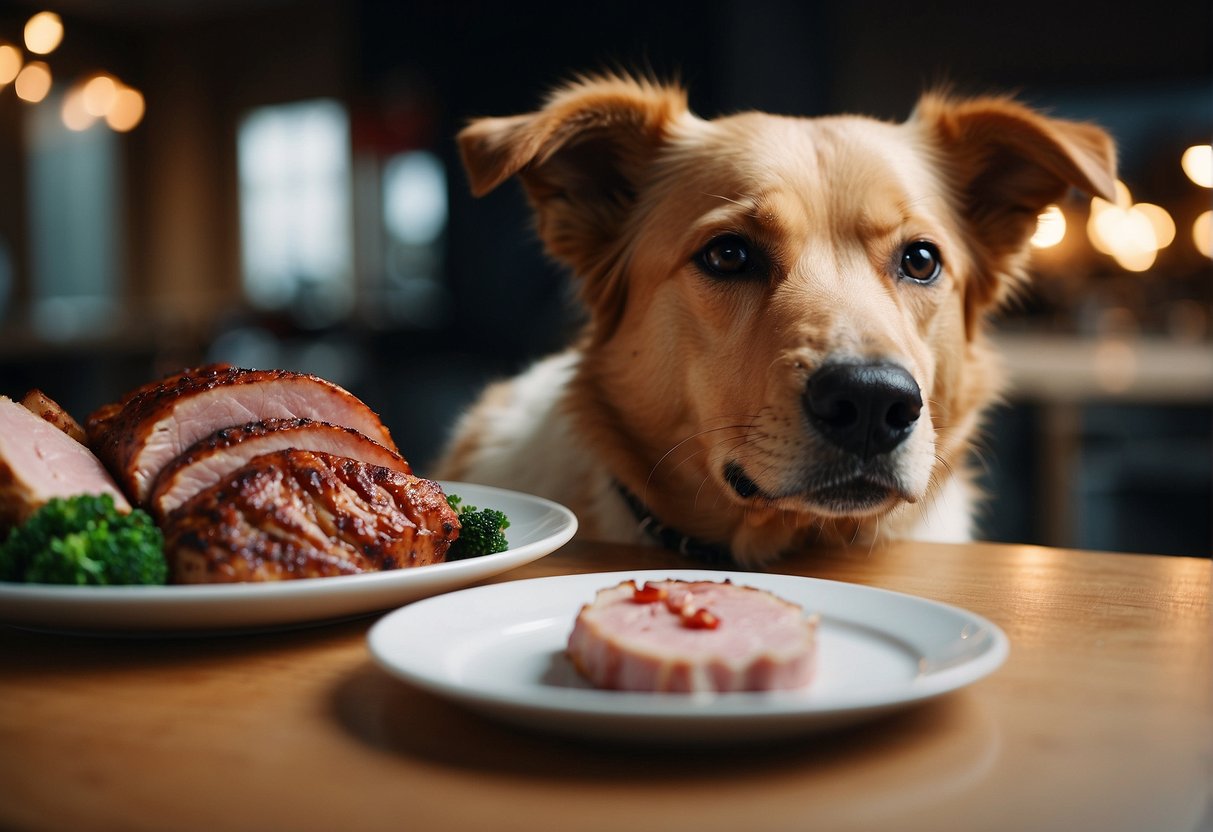
We often hear about the risks associated with giving dogs raw or undercooked pork due to the parasite Trichinella spiralis larvae, which can lead to trichinosis, a serious parasitic infection.
This is a reminder to us that proper cooking is critical when it comes to pork.
But that’s not the only reason we might want to avoid feeding pork to dogs.
High-fat foods, like some cuts of pork, have been linked to pancreatitis in dogs, a painful and dangerous condition that results from the inflammation of the pancreas.
Our intentions are always to care for our dogs and keep them healthy, but part of that responsibility involves being mindful of their diet.
While pork does offer proteins and vitamins beneficial for dogs, the risks sometimes outweigh the benefits.
We have to consider the digestive challenges and health complications that can arise from feeding pork to dogs, particularly if it’s rich in fat, heavily processed, or not cooked thoroughly.
We must carefully weigh the pros and cons of including pork in our dogs’ diets.
Pork Nutrition Facts
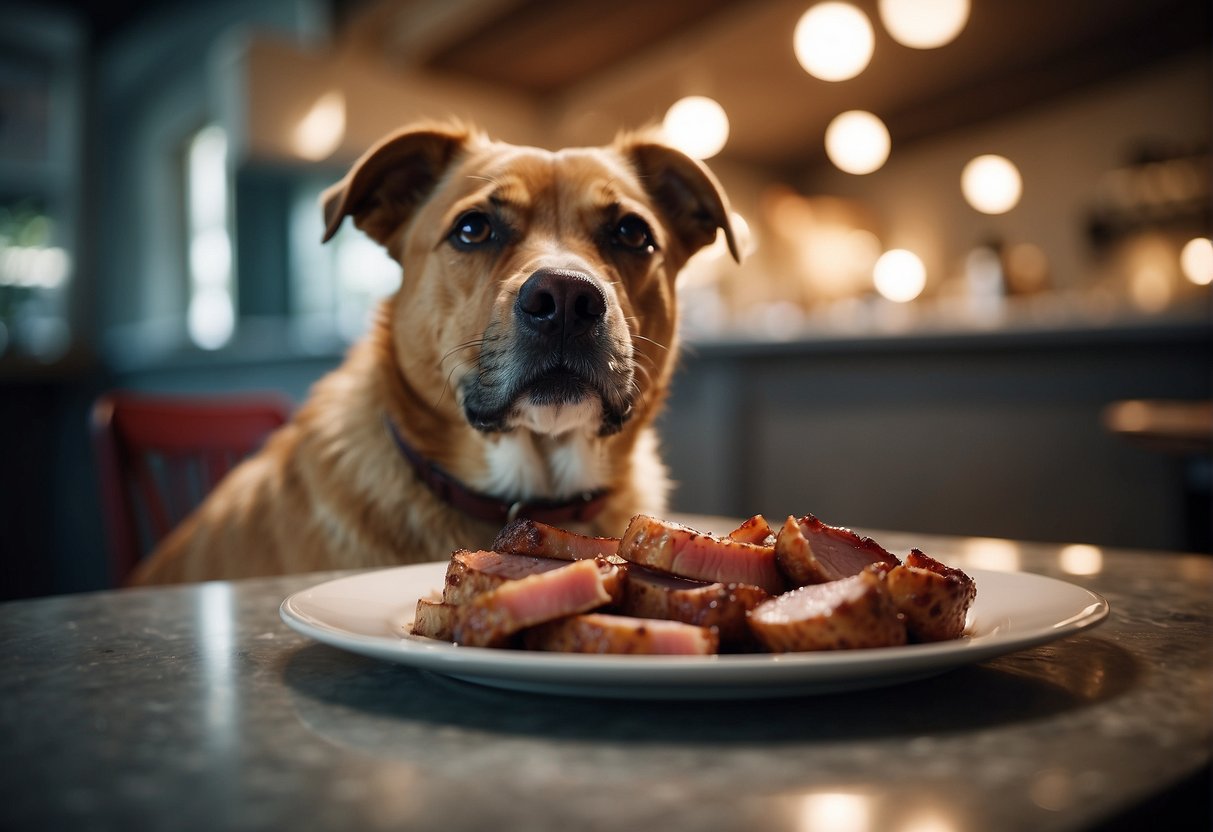
In this section, we’ll explore the nutritional content of pork, particularly focusing on its fat and protein levels, as well as the vitamins and amino acids it contains.
Fat Content and Health Issues
Pork is known for its high fat content, which can be a concern for our dogs’ health.
While some fat is necessary in their diet, excessive amounts can lead to weight gain and other health problems such as pancreatitis.
For instance, pork fat, which is especially rich and hard to digest, should be given with caution.
Protein, Vitamins, and Amino Acids
Our dogs need protein, and pork is a meaty option that can provide this essential nutrient.
It includes beneficial amino acids and provides a good supply of vitamins, such as thiamine, which is important for cell function.
But it’s important to remember to serve pork cooked and in moderation to ensure it’s safe for our furry friends.
Risks of Feeding Pork to Dogs
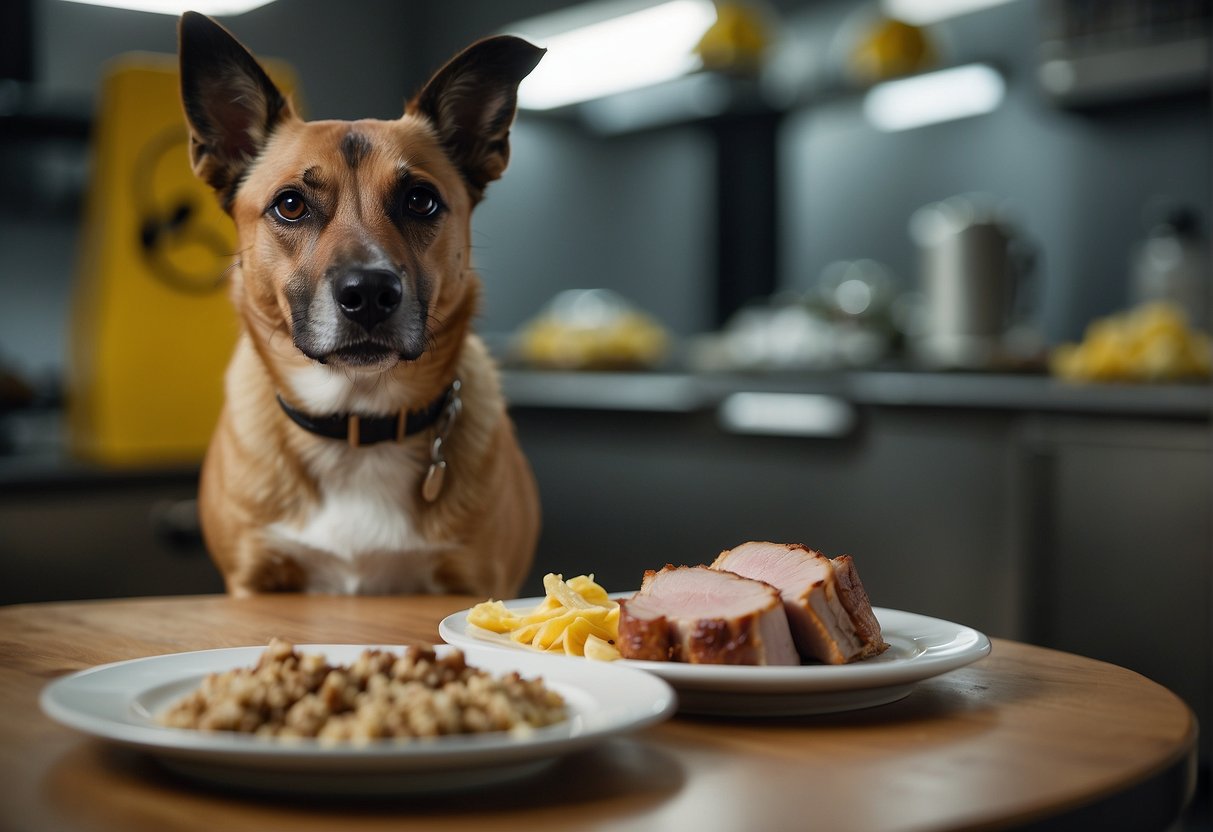
When we consider treating our canine friends with pork, we must understand the potential health risks involved.
From infections to digestive issues, it’s important to weigh these against the fleeting joy of a treat.
Parasites and Infections
Pork can be a host for parasites like Trichinella spiralis larvae, leading to trichinosis, a concerning infection for both us and our dogs.
If pork isn’t properly cooked, there’s also a risk of salmonella.
These infections can cause serious illness, leading to symptoms such as upset stomach, vomiting, and muscle inflammation.
Pancreatitis and Digestive Problems
Rich in fat, pork may trigger pancreatitis in dogs, an inflammation of the pancreas.
Symptoms include vomiting, intense abdominal pain, and digestive system upset.
We must also consider the individual tolerance of our dogs; some might experience an upset stomach or worse when fed pork, especially if it’s not part of their regular diet.
Choking Hazards and Bone Issues
Pork bones pose a significant risk. They can easily splinter when chewed, becoming sharp.
This can lead to choking, obstruct the digestive tract, or even puncture your dog’s internal organs.
Let’s ensure our pups stay away from these hazards to maintain their well-being.
Preparation of Pork for Dog Consumption

When we consider feeding our dogs pork, it’s crucial to understand the risks associated with raw pork and the precautions necessary for offering cooked pork.
The Dangers of Raw Pork
Raw pork poses significant health risks to our furry friends.
The presence of trichinella spiralis larvae can lead to trichinosis, a concerning parasitic infection.
It’s essential to realize that feeding raw pork or pork products can not only harm our dogs, but it can also be a risk for us.
- Never feed raw pork: It may carry harmful parasites and bacteria.
- Avoid raw pork bones: They can splinter and cause internal damage or blockages.
Cooked Pork: What is Safe?
When we cook pork for our canine companions, we have to strip it down to the basics.
- Plain cooked pork is key: No seasonings like onion powder or garlic powder, which are toxic to dogs.
- Cooked meat should be well-done: It eliminates the risk of parasites and bacteria.
- Beware of cooked bones: Though we might think they’re safer, cooked bones can still splinter and are not safe for dogs to chew or ingest.
We must ensure that the pork is as simple as possible to be a safe addition to our dog’s diet.
Alternative Foods for Dogs
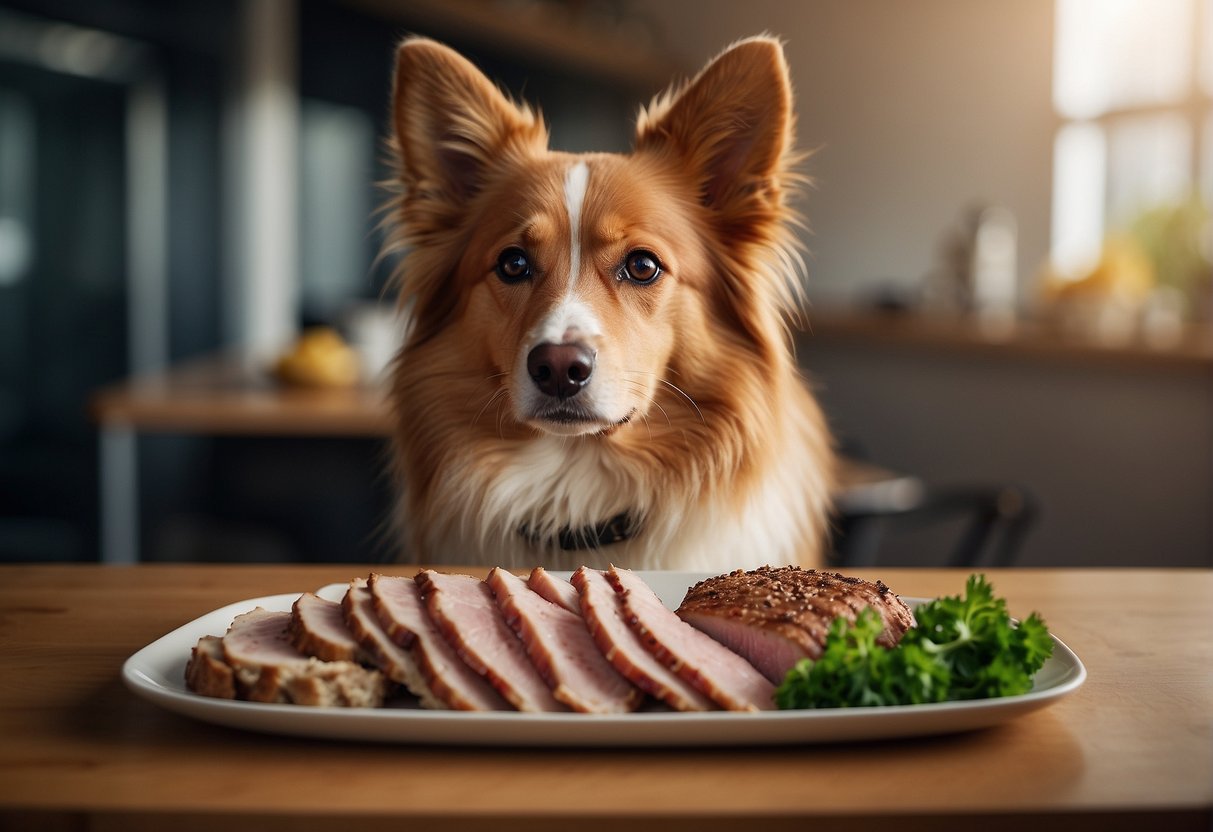
While we understand pork may not be the best choice for our canine friends, there are plenty of other nutritious and safe options out there.
Let’s take a look at some better-suited meats, as well as fruits and vegetables that can serve as wholesome substitutes in their diet.
Meats Better Suited for Dogs
When it comes to meat, chicken and beef are excellent sources of protein for dogs and are generally well-tolerated.
Here’s a quick rundown:
- Chicken: Offers lean protein and can be easier to digest, making it a good option for those with sensitive stomachs.
- Beef: Rich in iron and vitamin B12, it can be a tasty and healthy part of a dog’s diet.
- Lamb: Another alternative that’s often used in dog food for those with allergies to more common meats.
- Salmon: A great source of omega-3 fatty acids, which are beneficial for a dog’s skin, coat, and overall health.
Always ensure that these meats are cooked properly to avoid any potential for indigestion or the transmission of disease.
Fruits and Vegetables as Substitutes
Fruits and veggies offer a bounty of vitamins, fibers, and healthy fats without the risks that come with pork.
We’ve listed some dog-friendly options:
- Carrots: Crunchy and full of beta-carotene, carrots support eye health and can act as a low-calorie treat.
- Apples: A sweet treat without the fat, apples contain vitamins A and C and help to clean residue off a dog’s teeth.
- Blueberries: These little berries are jam-packed with antioxidants and vitamin C.
- Pumpkin: High in fiber, pumpkin can aid in healthy digestion.
Remember, when introducing new fruits and vegetables to your dog’s diet, do so gradually to prevent any allergies or indigestion and always remove seeds and pits to ensure safety.
When to Consult a Veterinarian
When we feed our dogs, it’s crucial to ensure their safety and health.
If you suspect your dog has eaten pork that could cause health issues, it’s important to recognize symptoms promptly and know when to seek veterinary assistance.
Recognizing Symptoms of Pork-Related Issues
If our dog shows signs of illness after consuming pork, we should be on high alert for symptoms such as:
- Diarrhea: Frequent loose or watery stools can indicate a digestive problem.
- Fever: A body temperature higher than 102.5°F is a sign of infection or inflammation.
- Lethargy: If our normally active dog is unusually tired, it warrants concern.
- Pain or stiffness: Watch for any signs of discomfort during movement.
These symptoms can suggest a pork-related issue, such as an infection caused by parasites like trichinella spiralis larvae, which can be present in raw or undercooked pork.
Preventive Tips and Regular Check-Ups
We can take several steps to prevent pork-related health problems in our dogs:
- Proper Cooking: Always ensure pork is thoroughly cooked to kill potential parasites.
- Avoiding Raw Pork: Especially due to risks of trichinosis, a raw diet including pork may not be safe.
- Regular Veterinary Visits: Scheduling check-ups can help catch any health issues early.
If we notice any concerning symptoms or if our dog has ingested pork that we’re unsure about, it’s best to consult our veterinarian promptly.
Regular check-ups are also vital for maintaining our dog’s health and can serve as a preventative measure against food-related illnesses.







